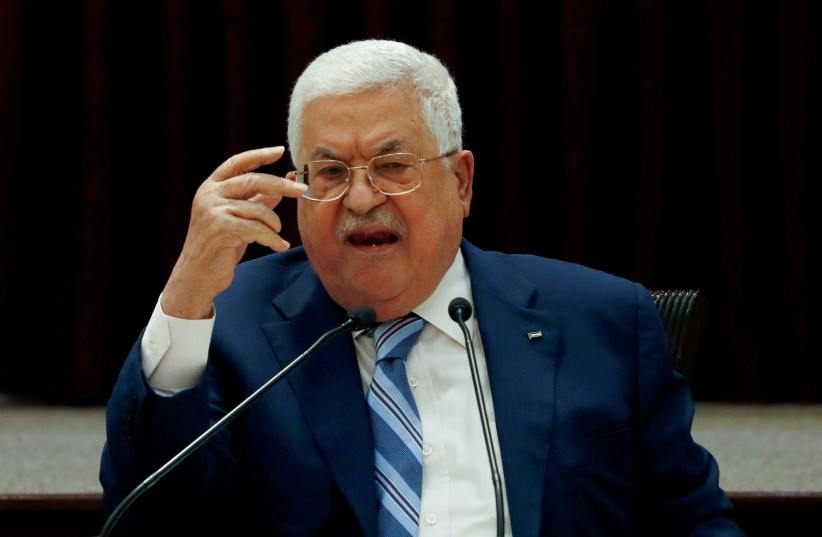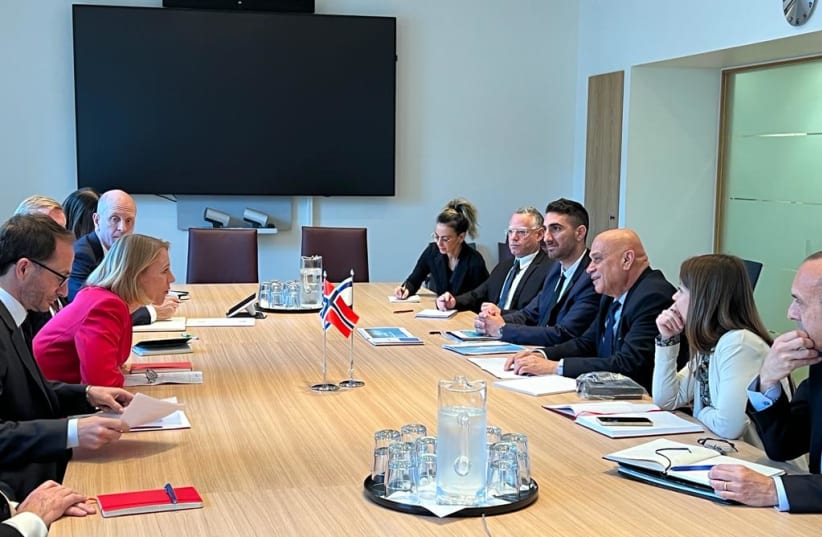Regional Cooperation Minister Esawi Frej appears to be having a high old time in the Norwegian capital, where he’s leading Israel’s delegation to the biannual gathering of donor countries to the Palestinian Authority.
Calling the session on Wednesday of the Ad Hoc Liaison Committee (AHLC) “important and fruitful,” Frej tweeted his gratitude to Norwegian Foreign Minister Anniken Huitfeldt for “hold[ing] in Oslo an optimistic conference that I believe will produce a new way forward.”
If the interview he gave to KAN Radio’s Kalman Liebskind and Asaf Liberman hours earlier is anything to go by, he was referring to his hope that the international community – whose contributions to the PA have gone down from $1.3 billion in 2011 to a “mere” few hundred million dollars annually in recent years – will resume heaping exorbitant sums on Ramallah.
Tripping over his tongue to formulate a plausible explanation for Israel’s participation in the gathering, Frej asserted that it was in the country’s best interest for the PA to be “strong and stable.” This, by itself, would have been sufficient to elicit a raised eyebrow, if not a belly laugh.
INDEED, IF the transfer of shekels, dollars and euros to PA Chairman Mahmoud Abbas and his henchmen had been a way of achieving such a pipe dream, it would have been realized decades ago. The trouble is that Abbas has never been interested in using the funds for institution-building. His entire agenda surrounds staying in power through the relevance that a lack of independent statehood gives him across the globe – legitimacy that he doesn’t receive from the people he rules.


Even the donor countries in Europe and the Arab world have grown weary of watching their investment in the PA squandered by its corrupt leadership, rather than put to proper use.
But Frej, from the left-wing Meretz Party, prefers to cling to the false narrative that the Israeli “occupation” is responsible for the plight of the Palestinians. He, like his fellow peace fantasists, still laud the disastrous Oslo Accords while bemoaning their failure.
This wasn’t the only minefield through which he had to tread lightly, though. When asked by Liebskind and Liberman how he will be able to make a case to the donor states to come to the aid of the financially strapped PA – at a time when Israel has been deducting hundreds of millions of shekels from the taxes on Palestinian imports and exports that it collects on behalf of Ramallah – he stumbled.
Well aware that the withheld revenue equals the amount paid by the PA in stipends to the families of Palestinians killed while committing terrorist attacks on Israelis, or to those survivors imprisoned for doing so, he answered: “We deduct that money because we can’t accept this situation.”
It was a reply that sounded like a dress rehearsal for similar questions he anticipated facing in Norway.
Perhaps he was planning on telling his counterparts at the AHLC that although Israel doubled the monthly deduction in August, it subsequently gave a NIS 500 million loan to the PA, in view of its dire straits. If this sounds incomprehensible to anyone paying attention to the goings-on in the Muqata (PA presidential headquarters), that’s because it is.
THERE WAS a reason that Israel decided in February 2019 to implement a law, passed by the Knesset seven months earlier, to authorize these deductions. The purpose of the legislation – like its precursor, the Taylor Force Act, which was approved by the US Congress in May 2018 – was to coerce the PA into ceasing its “pay-for-slay” policy and practice.
Israeli security officials initially opposed the move, on the grounds that it could endanger cooperation between Jerusalem and Ramallah and lead to an uptick in Palestinian terrorism. But the rape and murder earlier that month of 19-year-old Ori Ansbacher by a Palestinian wannabe “martyr” spurred the Israeli public to pressure the government of then-prime minister Benjamin Netanyahu to crack down on the PA.
Netanyahu thus announced that he would begin implementing the law if and when he received the green light from the security cabinet – which he finally did.
An angry response from the PA swiftly followed.
“The Palestinian Authority views the approval of the decision to deduct funds as a robbery of the Palestinian people’s money and as a unilateral violation of the agreements signed between the two sides, such as the Paris agreement,” Abbas spokesman Nabil Abu Rudaina said, referring to the 1994 Protocol on Economic Relations, part of the Oslo Accords.
“This decision will have dangerous consequences on all levels,” he threatened.
Israelis have grown used to such rhetoric from Abbas and his loyalists. Rudaina’s inversion of perpetrator and victim, therefore, was nothing new.
But the indignation expressed in his statement was ironic, given the fact that when the bill in question was first passed, Abbas proudly declared: “Even if we have only a penny left, we will give it to the martyrs, the prisoners and their families. We view the prisoners and the martyrs as planets and stars in the skies of the Palestinian struggle, and they take priority in everything.”
IN OTHER words, any financial woes suffered by those Palestinians who prefer to put food on the table without having to spill Jewish blood for the privilege were and still are out of luck. This inconvenient reality isn’t something that Frej and his ilk like to highlight, of course. No, they’re still stuck, literally and figuratively, in Oslo-land.
Yet, as Israel’s regional cooperation minister, he knows that he can’t simply ignore the conundrum, certainly not while engaging in fundraising for an entity that makes no bones about its fiscal emphases. His way around the predicament was to tell Liebskind and Liberman that he believes the Palestinians are on the verge of undergoing a genuine change in approach.
“They’re speaking about it in a very transparent and matter-of-fact manner,” he said, presenting no evidence to support the assertion, because there isn’t any. On the contrary, the PA-controlled press and education system are as filled with anti-Zionism, antisemitism and incitement to violence as ever.
Nevertheless, Frej took to Twitter at the conclusion of the conference to reiterate his enthusiasm about the “sense of optimism in the air.”
Displaying a group photo, he wrote that he was “proud to have attended the event, alongside its host, Foreign Minister Huitfeldt, PA Prime Minister Mohammad Shtayyeh, Jordanian Foreign Minister Ayman Safadi, PA Finance Minister Shukri Bishara, Qatari State Minister for Foreign Affairs [Soltan bin Saad] al-Muraikhi, US [Deputy Assistant Secretary of State for Israeli and Palestinian Affairs] Hady Amr and others.”
THAT FREJ fits right in with this collection of Palestinian apologists is a testament to the dangerous direction in which the Israel government is headed. Fluency in Arabic may be an asset for the politician with the “regional cooperation” portfolio, but it shouldn’t be employed in the service of a sworn enemy, which the PA decidedly is.
Shtayyeh, chumming it up with Frej at the AHLC, has been as clear as Abbas about Palestinian attitudes towards the Jewish state, whose capital the PA claims for itself. As Jerusalem Post correspondent Khaled Abu Toameh reported, on the eve of the PA prime minister’s trip to Norway, he accused Israel of working to Judaize Jerusalem through “annexation, ethnic cleansing and racism,” and vowed that the Palestinians would never cede “one inch of our land and Arab city.”
